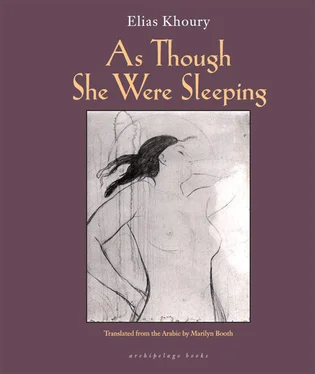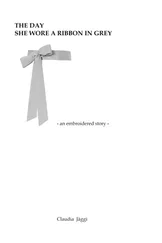You and the Messiah, the same work you both did! wailed Saadeh between sobs as they lifted the dead man into his coffin.
Such words — for shame! clucked the nun.
But he was a carpenter, and the Messiah was a carpenter.
Ayb! Shame on you, saying that. The Messiah loved fish, too, and he was a fisherman, said the nun.
But he was a carpenter too, said Saadeh. God forgive you, Yusuf, how could you leave me? But do say hello to my father.
Milia did not actually see her father in that final dream of him. She lied to everyone when she said she had seen him in the dream, carrying carpenters’ tools and walking next to a fine-looking bearded youth, the two of them entering together into a black cloud that enveloped them as it dropped a veil over the daylight. When she approached to kiss him, she fell. The nun picked her up and carried her out of the room.
When the nun said it — For shame, Mr. Yusuf! — she all but proclaimed Saadeh’s eventual recovery from the strange ailment that had sent her to bed.
No one knew the nature of the illness that had fallen upon the mother. She could barely walk. Getting up in the morning, she would do her best to set her feet on the floor but instantly she would feel too dizzy to stand up. She would call out in anguish and one of her sons would hurry over to help her out of bed. She could walk only by supporting herself against the wall and when she reached the kitchen she would start retching, soon to collapse again.
Hannah came to them because of that illness but she did not remain long. Saadeh improved through the nun’s miraculous intervention and there was no longer any real need for a maid. But still, Saadeh was not exactly well. True, she was able now to rise from her bed without anyone’s help. But she began to abandon the housework. More and more, little Milia was expected to cook and dust and wash clothes and clean house.
The mother’s illness entered the family story as if it had begun after the father’s death. Or because of it. Yusuf died when Milia was nine. Hannah came when she was four. As for Milia’s transformation into the undisputed mistress of the house, that did happen after the father’s death. Families invent their stories and then believe them. The story Milia lived placed the illness of her mother after Yusuf’s death, and that is what she believed. But Hannah did not seep into her consciousness through the cracks in her memory until she found herself alone beneath rays of sunlight that were vanishing in the white clouds covering the sky. She reached her hand into the cavity of water to extinguish the fire in her fingers, and that is how she saw Hannah exposing her breasts beneath the olive tree, squeezing them as she cried and the milk spurted out. Hannah was short and round, her face broad and pale, her eyes deep set beneath lush eyebrows, and her lips very full. Hannah sat down under the olive tree and shoved her breasts back inside her loose black gown, and saw Milia standing nearby, her eyes scared and confused. Hannah waved Milia closer. The girl came, stumbling over her feet, and heard Hannah say in a broken voice that she longed for her son.
The little girl did not understand much of the fragmented story told by the servant girl who had come from a distant village called Jaj in the region of Jbayl. But she felt the blood leaping to her cheeks as she ran back to the house. Her fingers dipping in the water now and a bemused smile playing on her lips, Milia tried to repair the memory of that woman. She remembered being told of a baby dying three days after his birth, a husband who disappeared from the village, and breasts engorged with milk. Milia heard Hannah’s voice as if it came from a hidden niche inside of her. My breasts are hurting. She was conscious of the hoarseness in the woman’s voice as Hannah asked if she would like to try tasting the milk.
No, it was not like that. Did Hannah really ask her this question? Pondering this, Milia did not know but she did sense the milkiness on her lips and recalled a vague fear propelling her to flee. Had she tasted the milk? If not, why had its sugary taste remained under her tongue so that whenever she was waiting for Najib she would be aware of that savor rising from her breasts to her lips?
After that, Milia no longer dared to leave the house for the garden. Hannah might be standing beneath the olive tree, turning her back on the old house and baring her breasts, their milk dripping onto the grass. What was Hannah’s story? And why had the nun thrown her out of the house?
The shadow-shape of the woman with the swollen breasts appeared over and over in Milia’s dreams. Yusuf’s brown face was there in the background, staring with fierce longing at the welling milk. Was. .? She didn’t have an inkling but she did know that Hannah had left her village and come to Beirut and worked as a servant in their home, and that her only child had died three days after his birth.
Hannah spoke of a baby with yellow hair who had lived three days. She said that the hair on his head — which reminded her of the fluff on the bodies and heads of tiny birds — went dry and hard like thorns and she knew that he had died.
But why had the nun thrown her out of the house?
Was it because Milia told of the breasts? And was she the only one to see the woman suffering, her breasts swollen and hardened with milk? Here on the edge of the garden basin at the Hotel Massabki, Milia could feel the milk and the painful swelling of those breasts. As a gray stain traveled over the sky, she closed her eyes and remembered.
She was alone, listless in the heavy heat, bare and taking a turn in the house’s garden. It was dark but not completely so. Why had she forgotten this intermittent dream amidst all the dreams that had crowded into her first night of marriage?
Little Milia stands naked before the pond in the garden of the old Beirut house, with its large olive tree. Snow is falling, white fluff scattering across the water’s surface. Yet Milia feels heat so oppressive she thinks she is suffocating.
Her short orange dress, which does not reach her knees, falls as though a hand has undone the long zipper stretching from the neckline to the lower back. The same hand, reaching for her underclothes, has ripped them off and the little girl sees herself naked out in the pond. The snow is falling on her — hot snow — and she gathers it to her chest. She feels thirsty and puts her tongue out for the snow. Floating on the water, she eats the snow; she consumes it but it does not satisfy her, it will not quench her thirst. Swimming, she feels no cold. Here is a dream that does not end; a thirst that will not end; a never-ending sleep; an endless snowfall; and water. Everything is swimming through the water; and little Milia swims and eats and sleeps and the snow covers her and the heat radiates onto her skin from deep inside.
As a shiver ran from her breasts to her belly Milia withdrew her hand from the water. She saw the face of her father, Yusuf, his eyes half closed. He was moving away from her and then coming closer, and she was trying to say something but her voice would not come out of her throat.
To her breasts swollen with milk, Hannah told the story: how her husband had divorced her and snatched the child from her hands. The child had not died, then, but had been stolen away. Why did Hannah say his hair had gone as hard and dry as thorns? Had his father killed him?
What does she mean, he divorced her? Milia asked her mother.
Don’t say that word, we don’t have divorce. Divorce is haraam .
Hannah disappeared and so did her story. Milia didn’t tell the story to anyone. Musa was the only one to whom she could tell things but he was too little. And by the time he was old enough the story had entered the realms of oblivion.
Читать дальше












